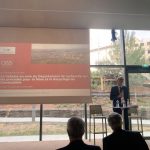The IAEA International Conference on the Management of Spent Fuel from Nuclear Power Reactors 2019 will take place in Vienna (Austria), from 24-28 June 2019.
The safe, secure and sustainable management of spent fuel from nuclear power reactors is key to the sustainable utilisation of nuclear energy and covers many technological aspects related to the storage, transportation, recycling and disposal of spent fuel and high level waste generated from spent fuel reprocessing.
The sustainability of nuclear energy involves the preservation of natural resources and the minimisation of generated wastes. Currently, in some countries, the uranium and plutonium remaining in spent fuel are recycled as mixed oxide (MOX) fuel in thermal reactors, saving natural uranium resources. Future advanced fuel cycles based on next generation reactors aim at making nuclear energy almost independent of uranium natural resources and will dramatically reduce the generated wastes.
The 2015 IAEA International Conference on the Management of Spent Fuel from Nuclear Power Reactors highlighted that there is little integration in the fuel cycle in terms of analysing how decisions made in one part of the fuel cycle may affect another part. Introducing efficiencies into individual steps in isolation can create additional challenges in subsequent steps. In most cases a technical solution can be found, but this is likely to come at a price. Therefore, one of the main challenges is to maintain enough flexibility to accommodate the range of potential future options for the management of spent fuel as well as to define and address the relevant issues in storage and transportation, given current uncertainties.





